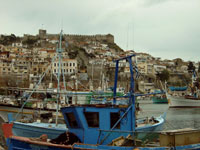|
|
 |
| Money |
 |
 |
 |
 |
 |
 |
On this site we have compiled a list of tips about how to deal with your money and which payment medium to use where:
Credit cards:
- Credit cards are less accepted in third-world countries. Apart from that they are more expensive than an EC card.
- Many banks have a kind of "payment package" covering the costs of all transactions in foreign countries, CC, EC cards and internet banking.
- Apply for more than one credit card (e.g. partner cards if you don't travel alone).
- Start using your credit cards well before you start travelling: your account can be blocked by the credit card firm if you withdraw larger amounts directly from the start!
- Get a list with AmEx offices for the countries you will be visiting ("AmEx Traveller's Companion").
- Apply for your credit cards before you quit your job. For some companies (e.g. AmEx) this is a fix requirement to get a credit card!!
- When paying with credit card:
On the road:

- Take both traveller's checks (TC) and cash with you (local currency, EUR and US$): at certain places neither TC's nor EUR / US$ are accepted!
- Always carry a number of 1 US$-notes with you. Use relatively new notes and keep them in good shape, otherwise they might not be accepted.
- in Europe, Latin-America and in the big cities in Asia you can usually get money using your EC-bank card. This is always the cheapest way to get money!
- the best places to change money are the neighbouring countries, who offer the best exchange rates.
- some countries have "currency declaration laws", so make sure you keep every receipt and report every theft at the police station.
- Always keep money and important papers seperately and divide them over more than one person: If one of you gets robbed, the other still has some money and documents left.
- Keep some change in your pocket that you can pay with. If you need to pay more than you have in your pocket, go to the toilet and get the money from your money belt, so that no one sees where you keep your money belt!
At home:
- Put your money on a international bank account, which is available worldwide.
- Have your money transferred from your savings account to your payment account every month.
- Have the bank restrict your maximum overdraft amount as an extra security in case your bank card gets stolen.
- authorize one of your relatives for your finacial business so they can take immediate action in an emergency (e.g. transfer money for hospital bills, pay your flight home).
- the fastest way to get money is having somebody at home transfer money to your AmEx personal checking account. You can then issue a (costless) check at a local AmEx office.
- Keep copies of all your (financial) documents at home.
Traveller cheques:
- Don't lose your personal checks! With counter checks you only get money in case of emergency and then barely enough to be able to leave the country.
- Make sure that you have enough personal checks and keep them separately: it can take a long time to get them replaced. AmEx replaces TC's and cards quicker than most other firms.
- Write down all the numbers of the TC's you bought and the ones you used on more than one place (e.g. in your diary, log and cash book).
Costs:
What you spend depends on the country you are visiting. In countries like Bolivia, Nepal or Iran you can live in luxury off a EUR 400 budget, while in e.g. Norway you have to be very tight to stick to EUR 100 per month.
Another major impact on your budget have larger expenditures like shippings etc.
Major costs we had were:
- Health insurance (OOM NV, www.oominsurance.nl): EUR 600 p.p. per year
- Grimaldi shipping to Argentina incl. 1 person: approx. EUR 2.600
- Flight NL - Argentina for 1 person and 2 dogs: approx. EUR 1.000
- Grimaldi shipping home: approx. EUR 1.800
- Flight Argentina - NL for 2 persons and 2 dogs: approx. EUR 2.400
- 3rd party insurance and tax at home: approx. EUR 2.400
All costs included we have lived off an average budget of EUR 1,250 per month for the two of us over the last 4 years.
|
 |
|
 |
|


